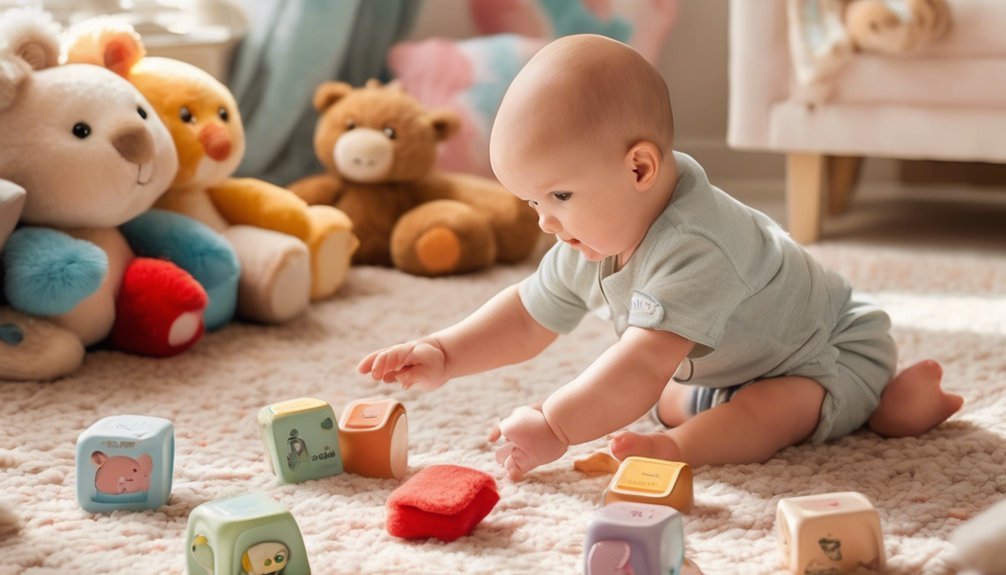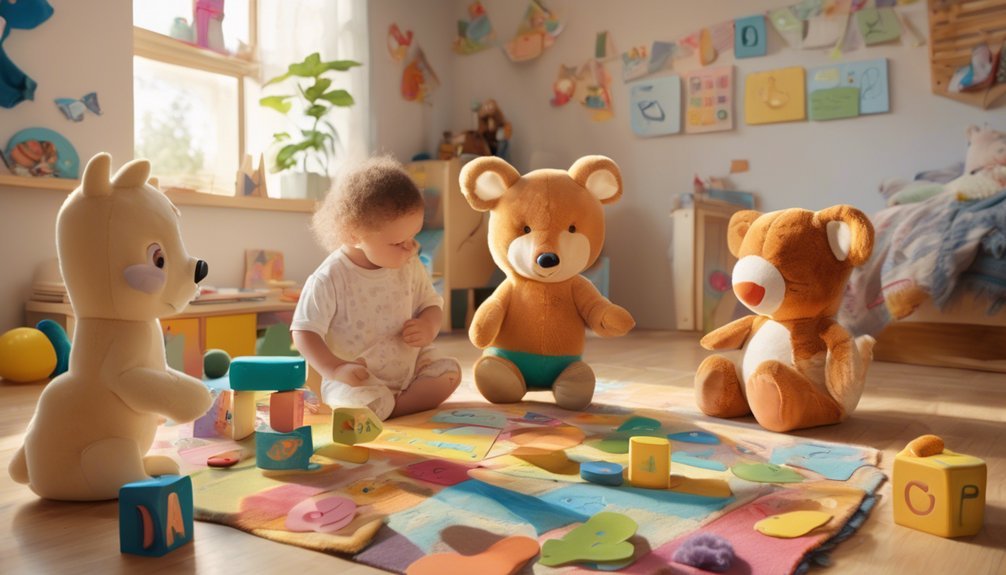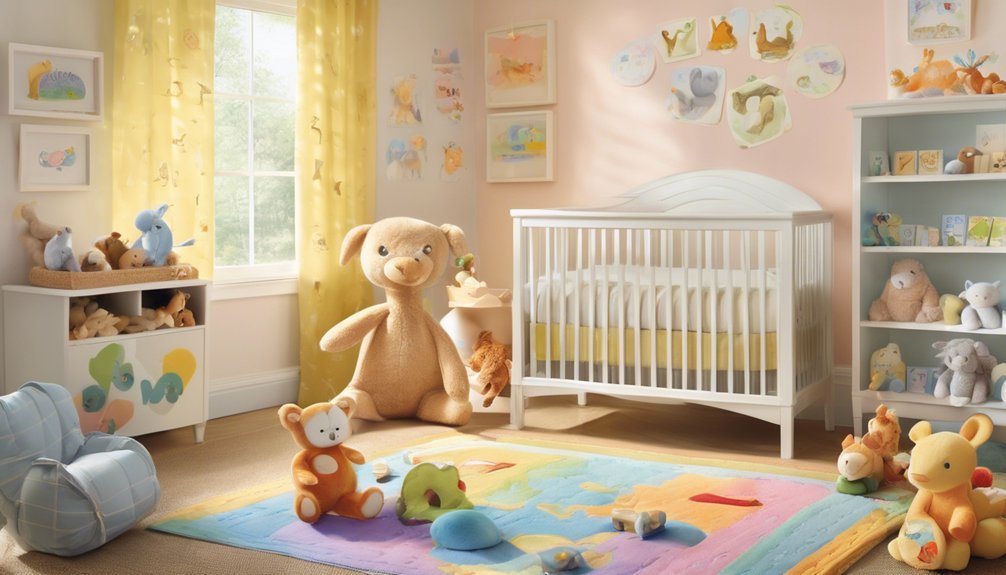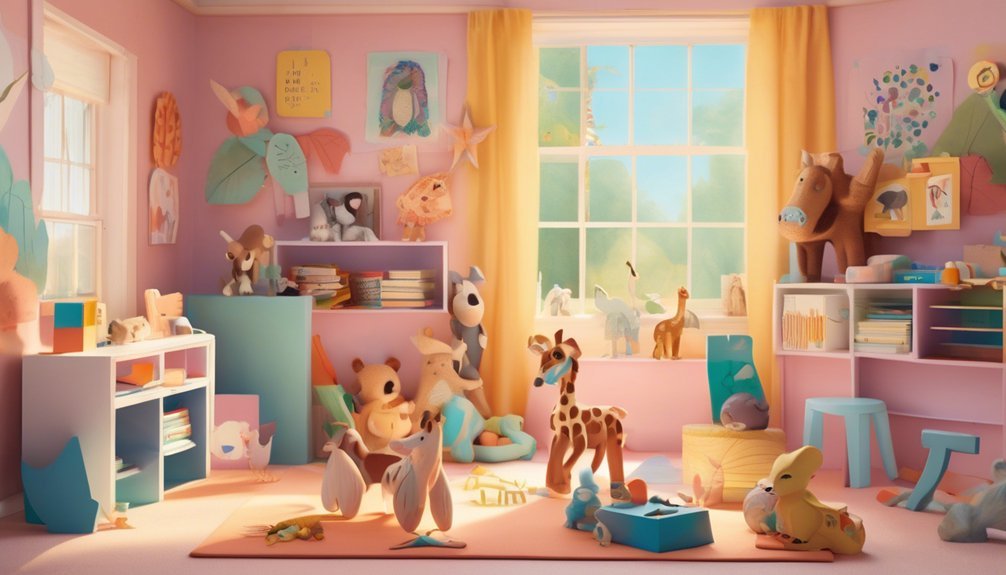When it comes to using flashcards for your baby, you might wonder about their actual effectiveness. Research shows that these tools can enhance vocabulary and memory skills, but their success largely hinges on how you engage with your child during the process. It’s not just about the cards; it’s about the interaction. So, what strategies can you employ to maximize their potential? Let’s explore the nuances of flashcard use and its impact on early learning.
Key Takeaways
- Flashcards enhance visual recognition by associating images with words, supporting early vocabulary development in babies.
- Repetition and interactive play with flashcards improve memory retention in young children during learning sessions.
- Engaging visuals and simple words on flashcards make learning enjoyable, fostering a love for education in babies.
- While effective, flashcards should complement diverse educational methods, balancing structured learning with free exploration.
- Parental involvement during flashcard sessions strengthens bonding and maximizes the educational impact on a child’s development.
Understanding Cognitive Development in Babies

As you embark on the journey of nurturing your baby’s cognitive development, it’s important to understand that this process begins even before they can speak or walk. Your little one will reach various cognitive milestones that reflect their growing understanding of the world.
Sensory development plays a crucial role here; through touch, sight, and sound, your baby learns to process information. Engaging them through simple games, varied textures, and colorful objects stimulates their senses, fostering neural connections.
Pay attention to their reactions—each smile or coo is a sign of their growing cognition. By creating a rich sensory environment, you’ll help them explore and learn, paving the way for future cognitive skills.
Nurturing this development lays a strong foundation for their lifelong learning journey.
What Are Flashcards and How Are They Used?
Flashcards are versatile tools designed to enhance learning by presenting information in a visually engaging format. You can choose from various flashcard types, such as picture cards for vocabulary or concept cards for ideas.
To make the most of them, try effective techniques like repetition and interactive play. Show your baby a card, say the word, and encourage them to mimic you. This not only helps with recognition but also deepens your bond as you explore together.
Incorporating colors and textures can captivate their attention even more. Remember, the goal is to make learning enjoyable, so keep it lighthearted and playful. With your guidance, flashcards can be a delightful way for your little one to discover the world around them.
The Science Behind Early Learning Tools
Understanding how early learning tools like flashcards work can deepen your appreciation for their role in childhood development. Cognitive theories suggest that children absorb information best when it’s presented in a variety of ways, aligning with their unique learning styles.
Flashcards engage visual and auditory senses, making them effective for reinforcing vocabulary and concepts. When you use them, you’re not just repeating words; you’re stimulating your child’s brain, fostering neural connections essential for learning.
This interactive approach also encourages active participation, which is vital for retention. By incorporating flashcards into your routine, you’re catering to your child’s natural curiosity and helping them build a strong foundation for future learning, nurturing their growth in a warm, supportive environment.
Potential Benefits of Using Flashcards

While you might be familiar with flashcards as a simple learning tool, their potential benefits extend far beyond mere memorization. By utilizing flashcards, you can support your baby’s visual recognition and enhance their memory development in engaging ways. Repeated exposure to images and words helps your little one build connections, fostering cognitive growth.
Here’s a quick overview of the benefits:
| Benefit | Description |
|---|---|
| Visual Recognition | Helps babies identify and associate images with words. |
| Memory Development | Encourages retention and recall through repetition. |
| Interactive Learning | Promotes bonding through shared playtime and exploration. |
Critiques and Concerns About Flashcards
Although flashcards can be a valuable educational tool, some experts raise concerns about their effectiveness, particularly for very young children. One common misconception is that flashcards alone will lead to significant learning, but they often miss the mark on fostering deeper understanding.
Critics argue that the rote memorization encouraged by flashcards mightn’t translate to real-world knowledge. Instead, they suggest that interactive play and experiential learning are more beneficial for young minds.
It’s important to remember that every child learns differently; relying solely on flashcards may overlook their unique needs. Balancing flashcard use with diverse educational methods can enhance overall educational effectiveness and support your child’s development in a more holistic way.
Age Appropriateness for Flashcard Use
When considering the use of flashcards, age appropriateness plays a significant role in determining their effectiveness. For infants, your little one’s attention span is quite short, so it’s essential to align flashcard activities with their developmental milestones.
Newborns and younger infants might benefit from simple, high-contrast images that capture their limited focus. As they grow, around six months, they start to show interest in more complex visuals and sounds.
You’ll find that around 12 months, they can engage with words and concepts, making flashcards a more interactive learning tool. Remember, the goal is to stimulate your baby’s curiosity and support their natural learning process, so choose flashcards that reflect their current stage of development.
Tips for Choosing the Right Flashcards

Choosing the right flashcards for your baby can greatly enhance their learning experience, so it’s important to consider a few key factors.
Look for flashcards that captivate your little one’s attention and support their development. Here are some tips to help you choose the best options:
- Color Schemes: Opt for bright, contrasting colors to engage your baby’s visual senses.
- Image Clarity: Select cards with clear, simple images that make recognition easy.
- Durability: Choose sturdy, wipeable cards that can withstand little hands.
- Age Appropriateness: Ensure the content is suitable for your baby’s developmental stage.
Effective Ways to Introduce Flashcards to Your Baby
To effectively introduce flashcards to your baby, start by making the experience interactive and enjoyable. Engage in playful activities that stimulate curiosity, like using colorful cards during sensory experiences. Show your baby the flashcards while you narrate, encouraging them to reach out and touch. This interactive play not only enhances their learning but also strengthens your bond.
Introduce a variety of themes—animals, shapes, or colors—to captivate their interest. Use your voice expressively and smile often; your enthusiasm will be contagious!
Keep sessions short and playful, allowing breaks to avoid overstimulation. Remember, the goal is to create a fun foundation for learning, so follow your baby’s cues and adapt to their preferences. Enjoy this special time together!
Integrating Flashcards Into Daily Routines
Although incorporating flashcards into daily routines might seem challenging, it can actually be a seamless and enjoyable part of your day. By integrating flashcards into your daily interactions, you can make learning a fun experience for both you and your baby.
Here are some ways to weave flashcards into your routine:
- Morning Boost: Start the day by reviewing flashcards during breakfast.
- Playtime Fun: Use flashcards during play to encourage playful learning.
- Storytime Integration: Incorporate flashcards that relate to story characters or themes.
- Bedtime Review: Wind down by recalling flashcards before sleep.
These moments not only foster learning but also strengthen your bond, making education a delightful part of your everyday life.
Alternatives to Flashcards for Early Learning

While flashcards can be a useful tool for early learning, there are plenty of engaging alternatives that can equally support your baby’s development.
Consider incorporating play-based learning into your daily routine. Activities like building blocks, sorting toys, or even simple role-play can foster cognitive skills and creativity.
Sensory activities, such as playing with sand, water, or textured materials, allow your baby to explore and learn through their senses, promoting fine motor skills and critical thinking.
Singing songs or reading stories together also nurtures language development in a fun, interactive way.
These methods not only enhance learning but also create precious bonding moments between you and your little one, reinforcing their emotional growth alongside intellectual development.
Success Stories: Parents Who Used Flashcards
Many parents have found that using flashcards can significantly enhance their child’s learning experience. They often share heartwarming stories about their flashcard success, showcasing how simple tools can lead to remarkable growth.
Here are some common themes from parent testimonials:
- Early Vocabulary Boost: Many noticed their toddlers picking up new words quickly.
- Interactive Learning: Parents enjoyed engaging their children in fun, interactive sessions.
- Memory Skills: Kids demonstrated improved recall abilities, impressing their families.
- Bonding Time: Flashcard sessions turned into cherished moments between parents and children.
These experiences highlight the effectiveness of flashcards in nurturing your child’s development while creating lasting connections.
As you embark on this journey, consider how flashcards could work for your family, fostering both learning and love.
Final Thoughts on Flashcards for Baby Learning
As you reflect on the success stories shared by parents, it’s clear that flashcards can play a significant role in your child’s learning journey.
Research highlights their effectiveness in enhancing learning retention, especially in early development stages. By introducing concepts through engaging visuals and simple words, you’re not just teaching; you’re fostering a love for learning.
Remember, the key is balance—combine flashcard sessions with playful activities to keep your little one engaged. Tailor your approach to your child’s unique needs and interests, ensuring that learning feels like a fun adventure.
Ultimately, flashcards can be a valuable tool, but your warmth, encouragement, and creativity will make the biggest impact on their educational experience.
Frequently Asked Questions
Can Flashcards Improve Language Skills in Infants?
Using flashcards can enhance language acquisition by engaging your infant’s cognitive development. When you interact with them through simple words and images, you’re fostering connections that support their growing understanding of language in a nurturing way.
How Often Should I Use Flashcards With My Baby?
To enhance memory retention, incorporate flashcards into your daily routine. Aim for short, consistent sessions, about 5-10 minutes each day. This gentle repetition fosters learning while creating cherished bonding moments between you and your baby.
Are There Specific Themes for Baby Flashcards?
Have you ever wondered which themes engage your little one best? Animal flashcards and color flashcards are popular choices, fostering curiosity and learning. Mixing themes can enhance your baby’s vocabulary and visual recognition skills beautifully.
What Age Is Too Late to Start Using Flashcards?
It’s never too late to start using flashcards! Different children reach developmental milestones at their own pace, and accommodating their unique learning preferences can enhance their experience, fostering a love for learning at any age.
Do Flashcards Require Parental Involvement for Effectiveness?
Yes, flashcards require parental involvement for effectiveness. Your engagement fosters interactive learning, making the experience enjoyable and enriching. When you participate, you strengthen your bond and help your child grasp concepts more effectively.
Conclusion
In the quest for your baby’s early learning, flashcards can be a powerful tool, but are they the magic solution you hope for? As you explore their potential, remember that it’s the interaction, creativity, and balance with other activities that truly spark cognitive growth. Will you find the perfect mix that not only engages your little one but also ignites their curiosity? The answers may surprise you, leading you down a path of joyful discovery together.




